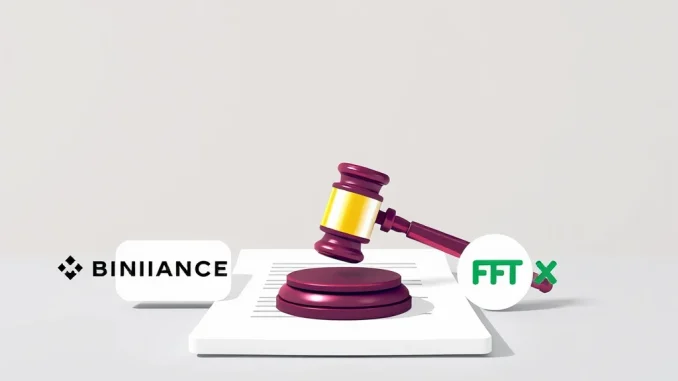
The legal battle between cryptocurrency giants Binance and the now-bankrupt FTX continues to unfold, with Binance recently making a significant move. In a high-stakes development, Binance has formally requested a Delaware bankruptcy judge to dismiss a substantial $1.76 billion lawsuit filed by FTX. This move is a critical point in the ongoing Binance lawsuit saga.
Binance Lawsuit: Why Binance Wants the Case Thrown Out
Binance’s defense against the Binance lawsuit is multi-faceted, centering on the argument that FTX’s claims are fundamentally flawed and lack legal merit or factual basis. According to reports, Binance contends that the root cause of FTX’s dramatic collapse was not any action taken by Binance, but rather internal mismanagement and fraud orchestrated by FTX’s own leadership.
Key arguments presented by Binance include:
- The lawsuit is legally deficient and should not proceed.
- FTX’s claims lack sufficient factual support to warrant a trial.
- The collapse of FTX was a result of internal issues, specifically fraud, within FTX itself.
- The court may not have proper jurisdiction over some of Binance’s foreign entities named in the suit.
Understanding the FTX Clawback Lawsuit
The lawsuit in question is an example of an FTX clawback action. In bankruptcy proceedings, a clawback lawsuit allows the bankrupt entity (in this case, FTX) to recover funds or assets that were transferred to others shortly before the bankruptcy filing. The goal is to ensure fair distribution of remaining assets among creditors.
FTX’s estate is attempting to claw back approximately $1.76 billion from Binance. This amount reportedly includes funds from various transactions and activities that occurred between the two entities before FTX filed for bankruptcy in November 2022. The success or failure of this FTX clawback effort is crucial for the recovery prospects of FTX’s creditors.
The Binance FTX Lawsuit: A Battle Over Jurisdiction and Blame
The core of the Binance FTX lawsuit boils down to a fundamental disagreement over responsibility and legal standing. FTX’s estate, under new leadership, is seeking to recover assets they believe were improperly transferred or represent preferential treatment to Binance before the collapse. Binance, conversely, asserts its transactions were legitimate and that FTX’s downfall was self-inflicted.
Furthermore, Binance has raised questions about the court’s jurisdiction, particularly concerning its international operations and subsidiaries. This jurisdictional challenge is a common tactic in complex international legal disputes and adds another layer of complexity to the already tangled Binance FTX lawsuit.
Impact on the Crypto Lawsuit Landscape
The ongoing legal battles between major players like Binance and FTX are significant markers in the broader crypto lawsuit landscape. They highlight several key trends:
- Increased Scrutiny: Regulatory bodies and legal entities are intensely scrutinizing past and present operations of crypto exchanges.
- Inter-Exchange Disputes: The collapse of one major exchange (FTX) has triggered legal actions against others, revealing the interconnectedness of the ecosystem.
- Focus on Funds Recovery: Clawback lawsuits are becoming a prominent feature in crypto bankruptcies as estates attempt to maximize returns for creditors.
- Jurisdictional Challenges: The global nature of crypto means legal disputes often involve complex questions of where cases should be heard and which laws apply.
The outcome of the crypto lawsuit involving Binance and FTX could set precedents for future cases in the industry.
FTX Bankruptcy and the Road Ahead
This dismissal request is just one part of the massive and complex FTX bankruptcy proceedings. The new management of FTX is tasked with recovering as much value as possible for the millions of customers and creditors who lost funds. This involves selling assets, pursuing litigation against insiders, and initiating clawback actions like the one against Binance.
The Delaware bankruptcy court will now consider Binance’s motion to dismiss. If the motion is granted, the $1.76 billion claim against Binance would be thrown out, significantly impacting the potential recovery for FTX creditors. If denied, the case would likely move towards discovery and potentially trial, a long and costly process for both parties involved in the FTX bankruptcy saga.
Summary: The Stakes Remain High
Binance’s request to dismiss the $1.76 billion FTX clawback lawsuit marks a critical juncture in the legal fallout from FTX’s collapse. Binance firmly maintains that FTX’s demise was due to internal fraud, not external factors involving their exchange. The arguments center on legal deficiencies in the case and questions of jurisdiction over Binance’s entities. This development underscores the intense legal scrutiny facing the crypto industry and the complex challenges involved in recovering assets in the wake of major failures like the FTX bankruptcy. As the Delaware court deliberates, the crypto world watches closely, understanding that the resolution of this Binance FTX lawsuit will have lasting implications for the parties involved and the broader crypto lawsuit landscape.



